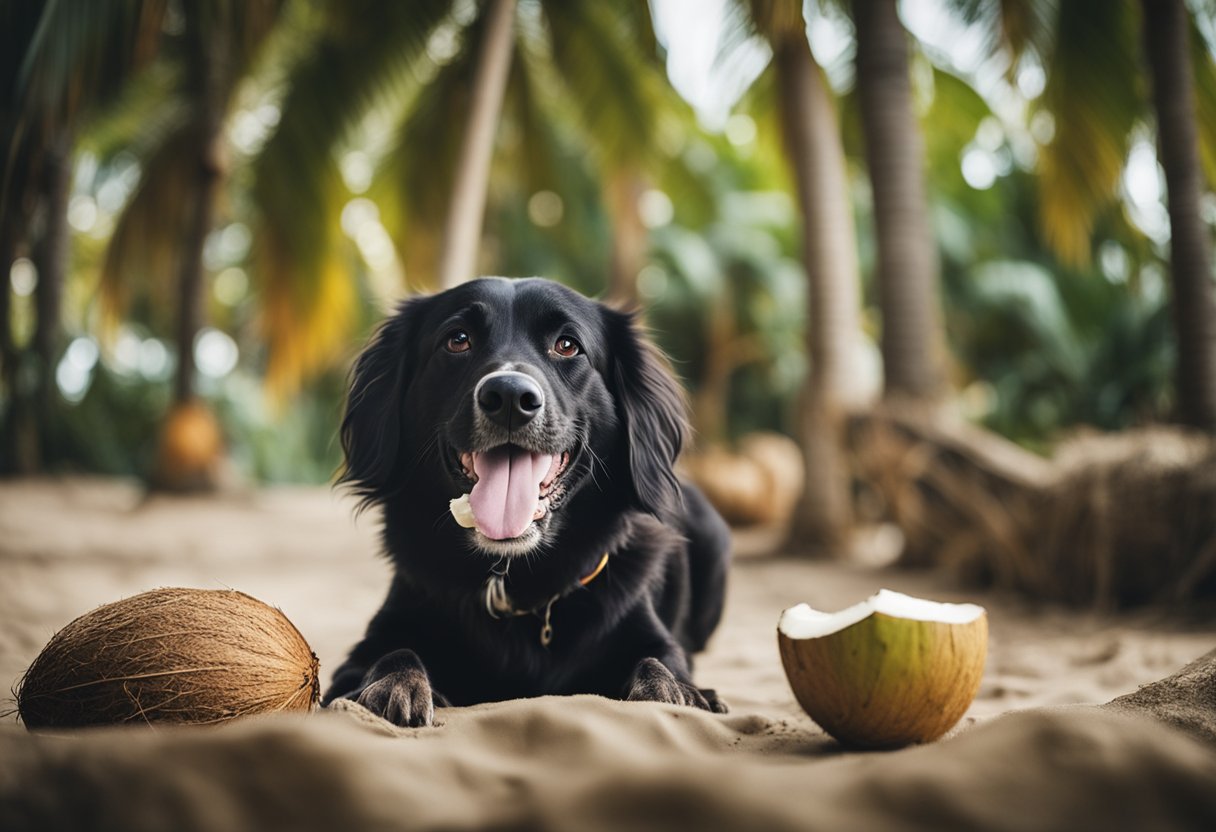Can Dogs Eat Coconut? Understanding the Benefits and Risks
Coconut can be a tasty treat for your dog, but it’s important to know how to offer it safely. Yes, dogs can eat coconut in moderation, and it can provide some health benefits. From the meat to the oil, different parts of the coconut can support your dog’s immune system and skin health.
However, there are some risks you should keep in mind. Not all forms of coconut are safe, and giving your dog too much can lead to stomach issues. It’s crucial to learn what types of coconut are beneficial and which ones to avoid, so you can keep your furry friend happy and healthy.
Key Takeaways
- Dogs can enjoy coconut, but moderation is key.
- Certain coconut products offer health benefits for pets.
- Be aware of potential risks when feeding coconut to your dog.
Nutritional Benefits of Coconut for Dogs

Coconut offers several nutritional benefits for dogs, including healthy fatty acids and potential improvements in skin health. Understanding these benefits can help you make informed choices about adding coconut to your dog’s diet.
Fatty Acids and Energy
Coconut contains medium-chain triglycerides (MCTs), a type of fatty acid that can provide a quick source of energy for your dog. MCTs are easier for the body to digest and can be converted into energy more rapidly than other fats.
Incorporating coconut into your dog’s diet may help with weight management, as MCTs can promote fat burning. These healthy fats may also support brain health, which is especially beneficial for older dogs.
Feeding coconut in moderation can enhance your dog’s overall vitality. Just remember to consult your vet before making any significant changes to their diet.
Coconut Oil and Skin Health
Coconut oil can improve your dog’s skin health, providing moisture and relief from dryness. When applied topically, coconut oil can soothe itchy skin and reduce the risk of infections caused by bacteria and fungi.
Additionally, the anti-inflammatory properties of coconut oil can help alleviate skin irritations. Regular use may lead to a shinier coat and fewer skin issues.
You can apply coconut oil directly on your dog’s skin or add a small amount to their food. This can help promote hydration from the inside out, supporting a healthy coat.
Potential Risks and Considerations

When considering feeding coconut to your dog, it’s important to think about potential risks. There are specific factors like allergies, proper serving sizes, and how often you should offer it that you need to be aware of.
Allergies and Sensitivities
Some dogs may have allergies or sensitivities to coconut. Signs of an allergic reaction can include itching, swelling, or digestive upset. If you are introducing coconut to your dog for the first time, do so gradually. Start with a small amount and watch for any unusual reactions. If your dog shows symptoms, stop giving coconut immediately and consult your vet. Dogs with pre-existing conditions or allergies may be more susceptible. Always check with your vet if you have concerns about introducing new foods into your dog’s diet.
Proper Serving Size and Frequency
Serving size matters when giving coconut to your dog. Too much can lead to digestive issues such as diarrhea or an upset stomach. A small piece of coconut meat can be a good starting point. Generally, treats should not exceed 10% of your dog’s total diet. Aim for a serving of about one teaspoon for small dogs and one tablespoon for larger dogs, offered no more than a couple of times a week. Always consider the size of your dog and adjust accordingly. Monitor your dog after feeding coconut for any signs of discomfort or adverse reactions.
Resources
To learn more about feeding coconut to dogs, several reputable resources are available. Websites like Vet Explains Pets provide detailed insights on the safety and health benefits of coconut for dogs. The American Kennel Club outlines dietary recommendations and potential risks associated with various foods. It’s wise to consult trusted veterinary resources for guidance on incorporating new foods into your dog’s diet. For specific questions related to your dog’s health, a conversation with your vet can provide personalized advice tailored to your pet’s needs.
Frequently Asked Questions

Coconut can be a healthy treat for dogs, but there are important details to consider. These FAQs cover the benefits and potential concerns of various coconut products for your pet.
What are the potential benefits of coconut oil for dogs?
Coconut oil can promote healthy skin and coat in dogs. It contains fatty acids that can help reduce inflammation and improve moisture in the skin. Many pet owners also notice shinier coats when adding coconut oil to their dog’s diet.
Is coconut water a healthy hydration choice for dogs?
Coconut water is a natural source of electrolytes, making it a refreshing hydration option for dogs. It is generally safe in moderation, especially during hot weather or after exercise. However, avoid giving too much, as excess can lead to an upset stomach.
How might coconut meat affect a dog’s digestion?
Coconut meat is rich in fiber, which can aid digestion in dogs. It can support healthy bowel movements when given in appropriate amounts. However, too much coconut meat may cause diarrhea, especially in dogs with sensitive stomachs.
Can coconut milk be included in a dog’s diet without risks?
Coconut milk can be given to dogs sparingly. It contains healthy fats but is also high in calories, so moderation is key. Some dogs might experience digestive upset, so watch for any signs of discomfort after consuming it.
Are there any concerns with feeding dogs dried coconut?
Dried coconut can be tougher for dogs to chew and digest. It is also higher in sugar and calories, which can be problematic for overweight dogs. Limit the amount, and watch your dog for any signs of digestive issues.
What should I be aware of if I give my dog coconut to chew?
When giving your dog coconut to chew, be cautious of the size and amount. Large chunks can pose a choking hazard. Always supervise your dog to ensure they chew safely and do not eat too much at once.

